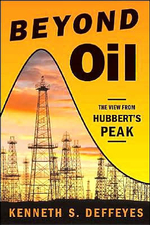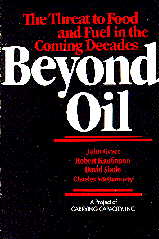|
|
Kenneth S. Deffeyes
Current Events: Join us as we watch the crisis unfolding, updates by Dr. Deffeyes [2007 Jan 19]
Author of Beyond Oil: The View from Hubbert's Peak and Hubbert's Peak: The Impending World Oil Shortage, Kenneth S. Deffeyes is Professor Emeritus at Princeton University. Before joining the Princeton faculty in 1967, he conducted research at the Shell Oil research laboratory in Houston and taught at the University of Minnesota and Oregon State University. The coauthor of Physical Geology and the author of numerous papers, he is perhaps best known to general readers as the guide/mentor in John McPhee's series of popular books on geology, collected and republished under the title Annals of the Former World.
What to do as oil peaks out: A geologist as amiable guide, by By Jane Holtz Kay, Christian Science Monitor [2005 May 17]
"'Hubbert's Peak,' the point on the graph that marks the apex of world oil production, has dropped below its zenith. And, for Americans dependent on their economy's lifeblood, the news goes against the grain of our optimistic belief in the eternal More. Whether you consider the shrinking of that commodity as bringing grim times for our manufacturing, driving, consuming nation, or, perversely, good times for a planet overrun with the greenhouse gases it produces, one thing is sure: There are life-altering changes ahead."
What Happens Once the Oil Runs Out?, by Kenneth S. Deffeyes, Op-Ed Contributor, New York Times [2005 March 25]
"PRESIDENT BUSH'S hopes for the Arctic National Wildlife Refuge came one step closer to reality last week.... Yet the debate over drilling in the Arctic refuge has been oddly beside the point. In fact, it may be distracting us from a far more important problem: a looming world oil shortage."
Read ongoing comments on current events from Dr. Deffeyes.
 |
|---|
 We are grateful to Dr. Deffeyes for helping to bring attention to the impending global oil crisis through his new book, Beyond Oil. We are grateful to Dr. Deffeyes for helping to bring attention to the impending global oil crisis through his new book, Beyond Oil.
That having been said, I must take exception to a critical statement made by Dr. Deffeyes at the beginning of chapter 8: "[Hubbert] saw nuclear power as the long-term replacement for oil..."
That was true in the 1950's but Dr. Hubbert's views changed dramatically in later years. I called attention to this before the book was published, but it was too late to make changes.
During a series of interviews conducted by Dr. Ronald Doel early in 1989, shortly before his death, Hubbert clarified his views on the nuclear option:
Doel: "Has your thinking about the problems of nuclear disposal changed since your first exposure to those issues back in the 1950's?"
Hubbert: "Not significantly. The problem is here, and it appears more intractable now than it did then. And the thing that finally influenced my attitude there for 10 years or so was if this problem is manageable, with the technology existing, using low grade sources of uranium, we had not infinite supplies but very large supplies of energy. Further, if we could go to fusion, and could utilize deuterium from the ocean, which could be extracted at small energy cost, as compared with its energy content, why, then you'd be at an almost astronomical level of energy resources. Well, what's subsequently happened, with regard to fission, and that is the irresponsibility of the AEC, of penny pinching financially, nuclear power without the backup of what would have to be done. That performance is still going on, essentially unaltered, and it drew me to the conclusion that that isn't the answer to our energy problems, and the sooner we get rid of it the better off we're going to be. I would never recommend shutting all the plants down tomorrow, but certainly phasing them out. See, we haven't faced up to the big problem: what are we going to do with these radioactive plants when we have to dismantle them? We haven't had that yet. So, that was when I took another look at solar energy, and I came to the conclusion ... it was a change of conclusion. Before, I thought that solar energy, although large, was so diffusive that it was impractical.
"I changed my mind on that. With solar cells, existing solar cells but with improvements, and utilizing what I call the chemical route of collecting in solar cells where there's good solar energy, storing it chemically, utilizing flat planes or tankers, liquids or gases, for delivery. That is entirely practical for producing all the industrial energy that we have any use for, with the very small fraction of available areas for collection.
Comments by Ron Swenson, editor
|

|  There is another book by the same name, Beyond Oil, written in the 1980's. In those days I copied a summary version made available by the authors and distributed it widely.
There is another book by the same name, Beyond Oil, written in the 1980's. In those days I copied a summary version made available by the authors and distributed it widely.
This book offered an appraisal of the global oil situation and brought attention directly to the Hubbert Peak long before others joined the chorus.
If you can get your hands on a copy, I encourage you to read this book. It offers insights into what can be done and the authors of the classic provide a well-reasoned assessment of humanity's future energy options.
Read more about the original "Beyond Oil" book.
|
 |
|---|
Commentary, Reviews and Debate
Public Debate ... Thomas S. Ahlbrandt, USGS, and Kennneth S. Deffeyes, Hubbert Peak author [May 29]
 When Wells Go Dry "Energy: The rate of global oil production will start to fall in just a few years, says a controversial geologist. And alternative technologies arenít ready yet." Newsweek [April 15] When Wells Go Dry "Energy: The rate of global oil production will start to fall in just a few years, says a controversial geologist. And alternative technologies arenít ready yet." Newsweek [April 15]
Will Gas Lines in the Coming Decade Make Those of 1973 Look Short?
"In Hubbert's Peak, Deffeyes writes with good humor about the oil business, but he delivers a sobering message: the 100-year petroleum era is nearly over. Global oil production will peak sometime between 2004 and 2008, and the world's production of crude oil 'will fall, never to rise again.' If Deffeyes is right--and if nothing is done to reduce the increasing global thirst for oil--energy prices will soar and economies will be plunged into recession as they desperately search for alternatives...." Review by Paul Raeburn, Scientific American [October 2001])
A low-gas warning
"A new book argues that the world's oil will soon peter out, but recent numbers are reassuring... "
"'Recent data suggests there is plenty of oil out there for the near term,' says IHS spokesman Pete Stark...." David Lagesse, US News and World Reports, Science & Technology [September 2001]
review by Ron Patterson
"I received my copy of "Hubbert's Peak" by Kenneth S. Deffeyes in the mail Saturday, and finished it in three days. It was great. So many of the questions that have been asked on this list were answered in this book. Where does the oil come from? How is the oil stored in the ground? Why can't we just drill deeper? What about the deep ocean? Deffeyes answers these questions and a hundred others you never even thought to ask, in just 190 pages of text...."
|

|
Hubbert's Peak: The Impending World Oil Shortage 
Chapter 1: Overview
Available at Princeton University Press or Amazon.com.
Description
Were the energy concerns of the past year a preview of everyone's future? Will gas lines in the coming years make those of 1973 look short? Is the present chaos in oil prices the leading edge of a more serious crisis that will rock national economies around the world? According to Kenneth Deffeyes, a geologist with extensive personal experience in the oil industry, the answer to all of these questions is yes. World oil production is peaking and will start to fall for good sometime during this decade.
In 1956, geophysicist M. King Hubbert--then working at the Shell research lab in Houston--predicted that U.S. oil production would reach its highest level in the early 1970s. Though roundly criticized by oil experts and economists, Hubbert's prediction came true in 1971. The hundred-year period during which most of the world's oil was discovered became known as Hubbert's peak--a span of time almost comically shorter than the hundreds of millions of years the oil deposits took to form.
Using the same methods that Hubbert used to make his stunningly accurate prediction, Deffeyes finds that a peak in world oil production is less than five years away. And he argues that new exploration and production technologies can't save us. While long-term solutions exist in the form of conservation and alternative energy sources, they probably cannot--and almost certainly will not--be enacted in time to evade short-term catastrophe.
Perhaps most surprising is that none of this is news to most specialists and many associated with the petroleum industry. But politicians, the media, and the public at large aren't hearing about it. Deffeyes wants to make sure they do. Thoroughly accessible and filled with entertaining anecdotes, his book demonstrates to the general reader why a global energy crisis is just around the corner. And, though the near-term scenario is ugly, he tells us what we can do as countries and individuals to thrive after Hubbert's peak has passed.
|
|





 © 1994-2011 • Ecotopia
© 1994-2011 • Ecotopia